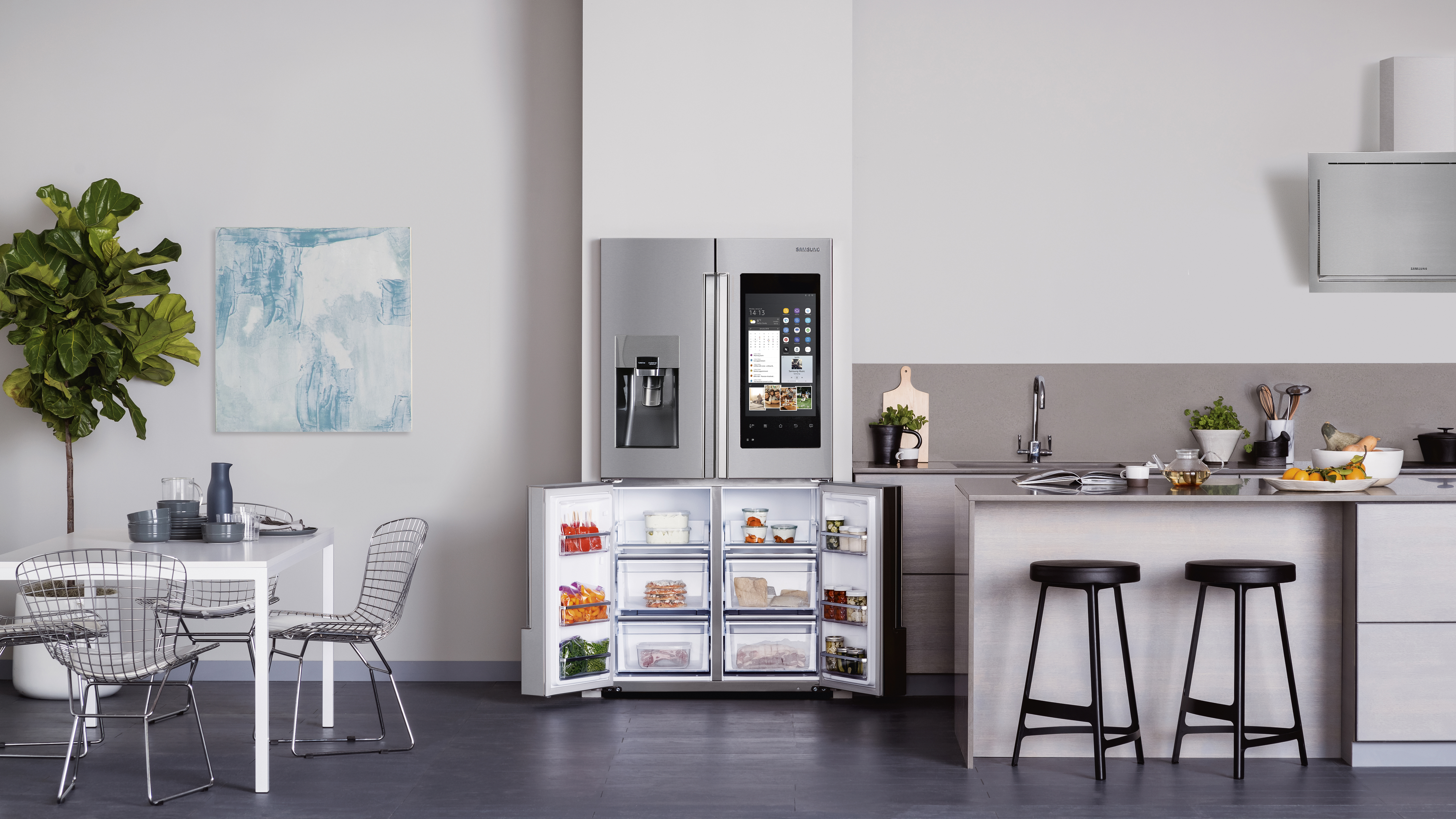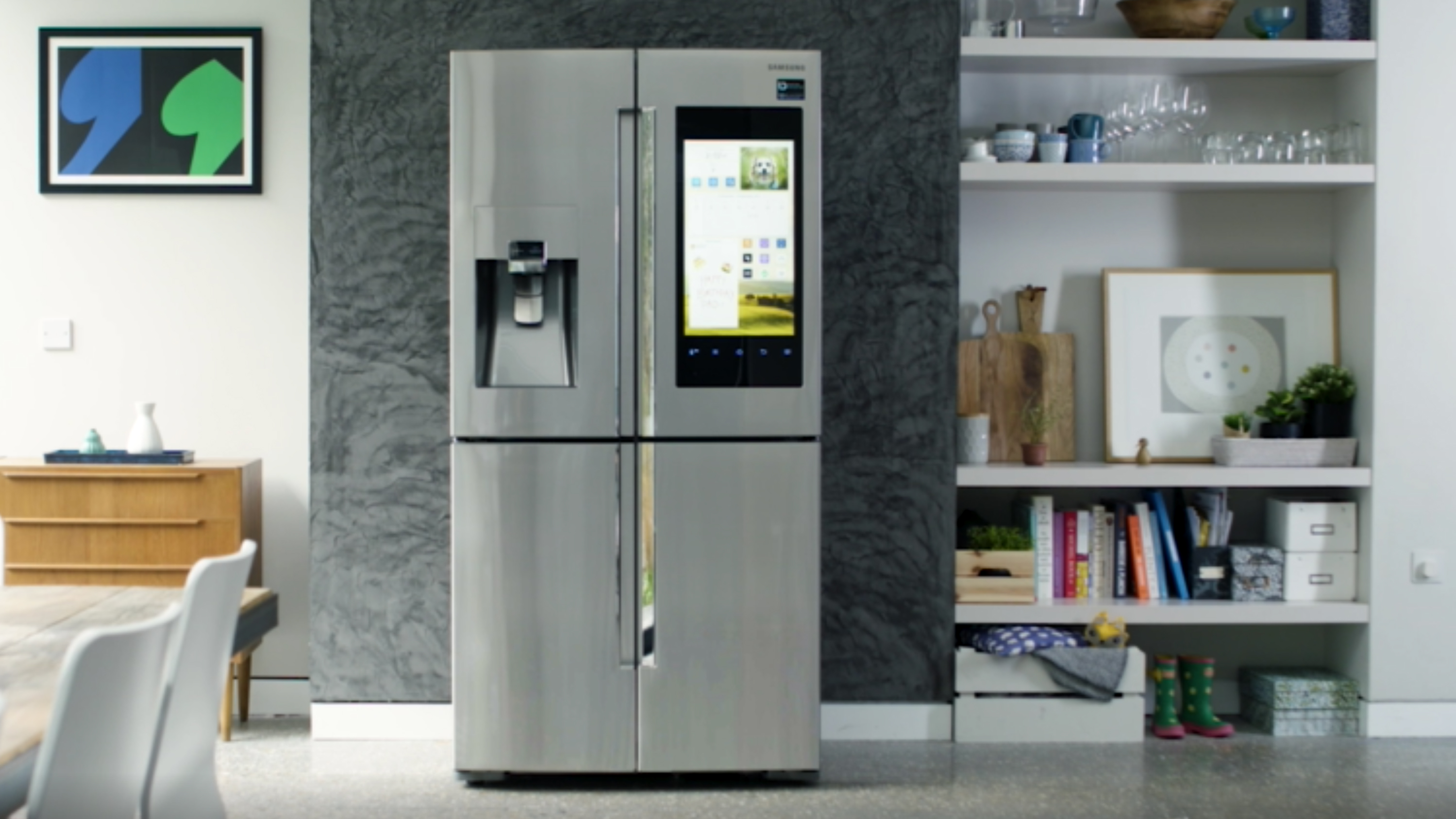What is a smart fridge and do I need one?
Wondering whether a smart fridge is worth the investment? We cut through the jargon and gimmicky features to share the useful reasons to buy one


Get small space home decor ideas, celeb inspiration, DIY tips and more, straight to your inbox!
You are now subscribed
Your newsletter sign-up was successful
Considering investing in a smart fridge? The fridge is the heart of the kitchen; a central focus for the whole family that’s found itself on the receiving end of plenty of additional features over the years. Double doors, ice dispensers, water coolers, fancy internal storage – when it comes to adding value to this kitchen mainstay, buyers have historically lapped them up.
It’s no surprise then, that in the era of the smart home, tech companies are turning their attention to our fridges in their attempt to smarten up our kitchens, too.
Smart fridges were big news at CES 2019, the world’s biggest technology trade show, and after several years of all the big manufacturers talking about them, they’ve finally started appearing in shops and homes. But do they actually make your life any easier?
We’re cutting through the jargon and gimmicky features to give you our honest opinion on whether a smart fridge is worth the investment right now – from the features to look out for, to the main contenders on the market, to help you decide if a smart fridge is for you.
See more of the best fridge freezers in our guide. Find more of the best smart home for your kitchen in our guide. And if you're looking for more advice, information and opinions when it comes to all things smart home, take a look at The Hub, our home technology page.
What is a smart fridge?
Like most things with 'smart' in their name, a smart fridge ultimately means one that is connected to the internet via your home Wi-Fi network. Here's what it can allow you to do:
Look up recipes
Being online allows it to do any number of things – the most obvious being the ability to make use of the internet’s resources, for looking up recipes for example, often with the help of a built-in smart assistant, such as Amazon Alexa or Google Assistant.
Send or receive messages
It also allows them to interact with other devices, such as sending or receiving messages to or from your smartphone, or acting as part of your smart home setup with other appliances in your home.
Interact with the family
Other features you’ll often find in a smart fridge include an LCD display, which acts as a family noticeboard for reminders, shopping lists or messages.
Control your fridge and its contents
Smart fridges also allow for remote temperature management, and you can track your fridge’s contents via an internal camera, which also informs you when you’re running low on things. Handy when you're at the supermarket and can't remember if you've run out of butter.
Cut down on food waste
Some fridges can even let you know when the expiration dates on stuff you do have are approaching, to help you waste less food.
But which of these features do you really need? Keep reading for our verdict.
Not sure if a smart fridge is for you? We'd advise you read this article in full, before making a decision, then browse our pick of the best fridge freezers.
What smart fridge features do you need?
1. Food monitoring
Whether you’re conscious about reducing food waste or just want to stay on top of what you’ve got in the house, investing in a smart fridge could be a step in the right direction.
That’s because the most advanced smart fridges are fitted with a built-in camera that allows you to check the contents of your fridge from your smartphone when out and about.
This is a great feature if you find you’re regularly re-buying food because you’ve forgotten what you’ve already got in your fridge, but also helpful for recipe inspiration, based on what you already have in stock.
That said, if your fridge is less than organised, seeing clearly what exactly is in there can be a little tricky. It’s also a huge expense to go for when you can just be a little bit more organised and make a shopping list – or buy a standalone fridge cam, like the Smarter FridgeCam to do the same job.
Do I need it?
A built-in camera is likely to be a ‘nice-to-have’ for those who are on-the-go, and who struggle to find time to plan meals effectively. It can be handy in reducing over-consumption during unplanned shopping trips, and can help you to plan meals around what you have in.
That said, it's far from an essential if you are willing to up your organisational skills, plus there are standalone devices that you can add to your current fridge if the feature really appeals to you.
Needability: 4/10
2. Keeping track of use-by dates
As well as cameras to let you know what’s in your fridge, some fridges allow you to assign products with use-by dates, and even receive reminders to pick up replacement items when the ones you have are past their best.
It requires a bit of manual input, but once you’re in the habit it takes less than 30 seconds to assign a date to a piece of food, which you can keep tabs on through the companion app or through the front panel on the fridge.
This also helps to reduce waste, so you don’t have something lying forgotten at the back of your fridge that you could’ve chucked in an omelette.
That said, if you're really serious about reducing food waste, you might want to start thinking about expiry dates a little more liberally. While we'd always recommend being cautious when dealing with meat, fish and dairy products the best before dates that appear on fruit, vegetable and dry goods are a guide and your eyes (and nose) are far better at telling you when something is still good to eat.
And if you are militant about expiry dates, you can log these as reminders on your phone in almost exactly the same way as you can on your fridge.
Do I need it?
This feels like more of a companion feature to a built-in camera rather than a standalone benefit that you might consider buying a smart fridge for.
If you're a stickler for use-by dates, or have a hectic, unpredictable schedule that often results in coming home to a fridge full of gone off food, this tool could be handy in helping you manage your fridge more effectively.
Realistically though, it’s likely to be one of those features that goes unused after the first couple of weeks.
Needability: 2/10
3. Temperature and humidity controls
Most smart fridges are aimed at families, so they aren’t short of space. But being able to adjust how the space inside of them works is helpful.
With different ingredients requiring different temperatures to stay at their best, your smart fridge should offer a choice of temperature options to help your food stay fresher longer.
Some will have drawers or doors you can adjust - some will even have compartments that are able to switch from a fridge to a freezer.
Smart fridges will allow you to do this on the fly, usually from the companion app on your smartphone or on the LCD screen on the fridge door.
Having this kind of control is great, but non-smart fridges have had manual temperature controls for some time, as well as features like crisper drawers and fresh drawers, aimed at keeping food better for longer.
You may not be able to tailor your fridge as carefully to your requirements, but certainly the top-of-the-range regular fridges won’t be short on options for this kind of stuff.
Do I need it?
The flexibility is useful in a family fridge that needs to adapt to suit its contents, but most standard fridges have some form of manual temperature controls and special drawers and compartments that will get you a similar result.
The ‘smart’ element to it is fun, but far from a necessity.
Needability: 4/10

Samsung RF56M9540SR/EU Family Hub™ smart fridge
4. Sensors and alerts
If you’ve ever left the freezer door open, and come home from work to a freezer load of soggy defrosted food, this feature is likely to pique your interest.
Most smart fridges come with built-in sensors that can let you know when a fridge or freezer door has been left open, by pinging a notification to your smartphone.
Some even work in reverse and feature sensors that will open the door automatically when it senses someone is stood in front of it. Thankfully they claim to be smart enough to be able to distinguish between you and a pet or baby.
Do I need it?
While the open door sensor would be useful, you can buy non-smart fridges with door alarms that will sound after a certain amount of time, or you can even buy standalone devices to sit in your fridge door that will do the same job.
As for the automatic door opening, while it would be helpful when you’ve got your arms full of shopping, it feels a little like one of those features that’s ‘smart for smart’s sake’.
Cool to show off to your mates the first few times, but ultimately a feature you wouldn’t miss if it wasn’t there.
Needability: 5/10
5. Connectivity
This is the biggie, and arguably one of the main reasons to buy a smart fridge. Being able to connect your fridge to the internet opens it up to benefit from the world of apps, which sort of makes the possibilities endless.
Some fridges have speakers, so you can play music from Spotify on them. Others offer the ability to search for recipes from the main LCD screen, or order groceries directly from your fridge door.
Most smart fridges now also support some sort of smart assistant, such as Google Assistant or Amazon Alexa. As well as being able to ask your fridge all the random questions you might ask any other smart assistant-powered device in your home, it also allows it to join into a wider smart home system to be controlled from your phone or tablet.
It’s features like these that make owning a smart fridge tempting, but once again, it’s about weighing up how much you really need these features in your fridge, specifically. You can bring up recipes and order groceries on your phone, most of us have a speaker or radio in our kitchens for music already, and if having a smart assistant in your kitchen is important, you can buy a Google Home Mini or Amazon Echo separately for less than £100.
Do I need it?
Probably not, but the endless possibilities to what being online can offer devices does have the potential to deliver even more interesting features down the line, as new apps are developed. It’s the most compelling argument to keep an eye on smart fridges, to see what’s coming next.
Of all the kitchen devices, though, smart home connectivity seems the least useful in a fridge. While you might want to switch on the oven or washing machine from afar, your fridge has fewer controls you’re going to want to adjust as part of a smart home setup.
Needability: 6/10
What are the best smart fridges?
Considering investing in a smart fridge? Here's our pick of the best:
1. Samsung RF56M9540SR Family Hub Smart Fridge Freezer

Samsung has been one of the biggest brands in smart fridges, and the Family Hub fridge as this is known, is now into its fourth generation.
Interactive touch screen
It features a huge 21.5in screen on its fridge door, which acts like a super-sized tablet, offering you access to apps such as AllRecipes for recipe inspiration and Groceries By Mastercard for shopping orders.
It also acts as a large whiteboard for leaving messages for the family and can even mirror a Samsung TV so you can watch the TV on your fridge while cooking dinner.
Built-in cameras
There are three cameras inside, so you can keep an eye on the food in your fridge, with programmable freshness reminders and remote temperature controls for keeping your food at its best for longer.
Smart assistant
Samsung uses its own smart assistant Bixby here, which might not be quite as advanced as Alexa or Google Assistant, but it is getting better, with a wider range of apps that you can access by voice.
Capacity
It’s got plenty to shout about as a fridge too, with a massive 550ltr capacity across the fridge and freezer, and a front-mounted water and ice dispenser.
2. LG InstaView GMX936SBHV

The LG InstaView gets its name from its unique glass window, which allows you to see inside your fridge without opening the door. All you need to do is tap on the door panel twice to have it switch from an opaque panel to a see through one. Clever stuff.
Cooling technology
Compared to Samsung’s app-packed fridge, the LG focuses more on cooling technology for the best in food freshness, including a system that prevents frost build up in the freezer and special temperature-controlled compartments – all of which can be tweaked from your phone.
Capacity
It has an overall capacity of 571 litres, so plenty of space for a whole family’s food, and an ice and water dispenser on the front too.
It might not sound quite as smart as Samsung’s offering, and that’s because it isn’t. But LG did announce the LG InstaView ThinQ fridge freezer at CES 2019, which will feature Amazon Alexa functionality, a transparent 29in LCD touch screen and built-in speakers. No firm details on when it will arrive in stores, but we’ll update you when it is.
3. Bosch Serie 6 KGN36HI32

It doesn’t come with all of the bells and whistles of an all-singing, all-dancing smart fridge, but the Bosch Serie 6 comes in significantly cheaper than them while offering one of their key features – fridge cameras.
Home Connect cameras
The two Home Connect cameras can be accessed from your smartphone for a peek inside your fridge from afar at any time.
FreshSense sensors
They join Bosch’s FreshSense sensors, which constantly monitor and control the temperatures inside the fridge and freezer to keep food fresher for up to two times longer. You can’t tweak them from your smartphone in the same way you can with LG and Samsung’s efforts, but there’s plenty of manual control if you need it.
Capacity
There are 320 litres of storage across the fridge freezer, which isn’t as cavernous as some of the super-sized American-style fridge freezers, but should offer plenty for the average family.
RRP: £900
Should I buy a smart fridge?
Determining whether a smart fridge is worth the investment comes down to how you plan on using it and whether you will realistically make the most of all its features.
After all, for the smartest of smart fridges, it's a big investment – around £3,000 at least – so you'll want to think carefully about whether it's worth the money, or whether you'd be equally satisfied with a top-end conventional, non-smart fridge with a few added features.
That said, the Samsung model we have looked at is only £500 more than a similar size Samsung model without the Family Hub tech, so if you were already budgeting a couple of thousand for a new fridge-freezer, the added tech isn’t a huge step-up in price.
If your budget is much more humble, but you still like the idea of a smart fridge, you might consider something like the Bosch Serie 6 as a more affordable alternative, and introduction to the smart fridge way of life.
But if you always shop with well-prepped list, meal plan like a pro and are happy with using a tablet or smart phone for all of the other extra features a smart fridge currently offers, then we’d recommend saving your dosh, until the benefits of a smart fridge become absolute must-haves, rather than nice-to-haves.
Something like the Samsung RF56J9040SR American Fridge Freezer or the Samsung RS8000 RS68N8240S9 American Fridge Freezer would leave you £500 or £1,000 better off, respectively. And that could buy you an awful lot of Prosecco...
Looking for more smart home tech advice and inspiration?
Get small space home decor ideas, celeb inspiration, DIY tips and more, straight to your inbox!
Verity Burns is our smart home tech expert. She has been writing about technology for over a decade, and spends a lot of time tinkering with the latest in smart home tech for The Hub section of Realhomes.com. You may even spot her chatting about smart home best buys and top tips on The Real Homes Show. When she's not writing, reviewing or offering tech support to various members of her family, she's a mum of three – one real baby and two furry ones. You'll always find her in the living room, recalibrating terrible TV settings at parties.
